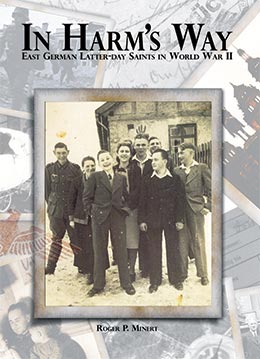Breslau Center Branch, Breslau District
Roger P. Minert, In Harm’s Way: East German Latter-day Saints in World War II (Provo, UT: Religious Studies Center, Brigham Young University, 2009), 116-20.
Four months after World War II began, the East German Mission records showed the Breslau Center Branch having a total of 168 members. Thus it was the smallest of the three branches in Breslau, the capital city of Silesia, where approximately 550,000 people lived in 1939. Although there were challenges living in a huge city dominated by Catholics (60 percent) and Protestants, Latter-day Saint eyewitnesses felt that the impersonal character of a German metropolis allowed for tiny religious groups to be overlooked. Consequently, they were not bothered.
The Center Branch met in rented rooms at Sternstrasse 40, a short distance northeast of downtown. The territory covered by the branch was essentially the section of Breslau north of the Oder River.
| Breslau Center Branch[1] | 1939 |
| Elders | 11 |
| Priests | 3 |
| Teachers | 2 |
| Deacons | 11 |
| Other Adult Males | 24 |
| Adult Females | 100 |
| Male Children | 8 |
| Female Children | 9 |
| Total | 168 |
As was often the case in Germany, the branch met not in the main building on Sternstrasse, but in the first structure behind that building. Churchgoers passed through a large portal of the main building, crossed an interior courtyard, then entered the first Hinterhaus. Irmgard Gottschalk (born 1920) recalled that the branch rented rooms on two floors of that building.[2]
Nearly 60 percent of the members of the Breslau Center Branch were adult females. This was not at all unusual in the branches in Germany. Indeed, the proportion of adult females in the Breslau District was 53 percent and in the entire mission 57 percent.[3]
The East German Mission records show the following entry for Sunday, March 12, 1939: “Herbert Neumann is appointed president of the Breslau-Center Branch, with Paul Franz as first counselor and Paul Fiedel as second counselor.”[4]
Irmgard Gottschalk had served her Landjahr back in 1934. At the age of fourteen, she spent six months on a farm on the island of Usedom in the Baltic Sea. She enjoyed the work there but noticed the lack of religion under those circumstances: “It was a nice time for girls our age, but nobody put much emphasis on religion and such things.” There was no branch near Usedom, so Irmgard could not attend church until she returned to Breslau.
The Gottschalks were one of the many German families who were opposed to war. When the German army invaded Poland on September 1, 1939, Irmgard recalled hoping that there would be no war: “Many people were against what was happening but nobody could say anything; you had to be careful. It was a dull feeling that we had.” Her two brothers were drafted right away. “It was not a nice feeling to see them leave,” she recalled.
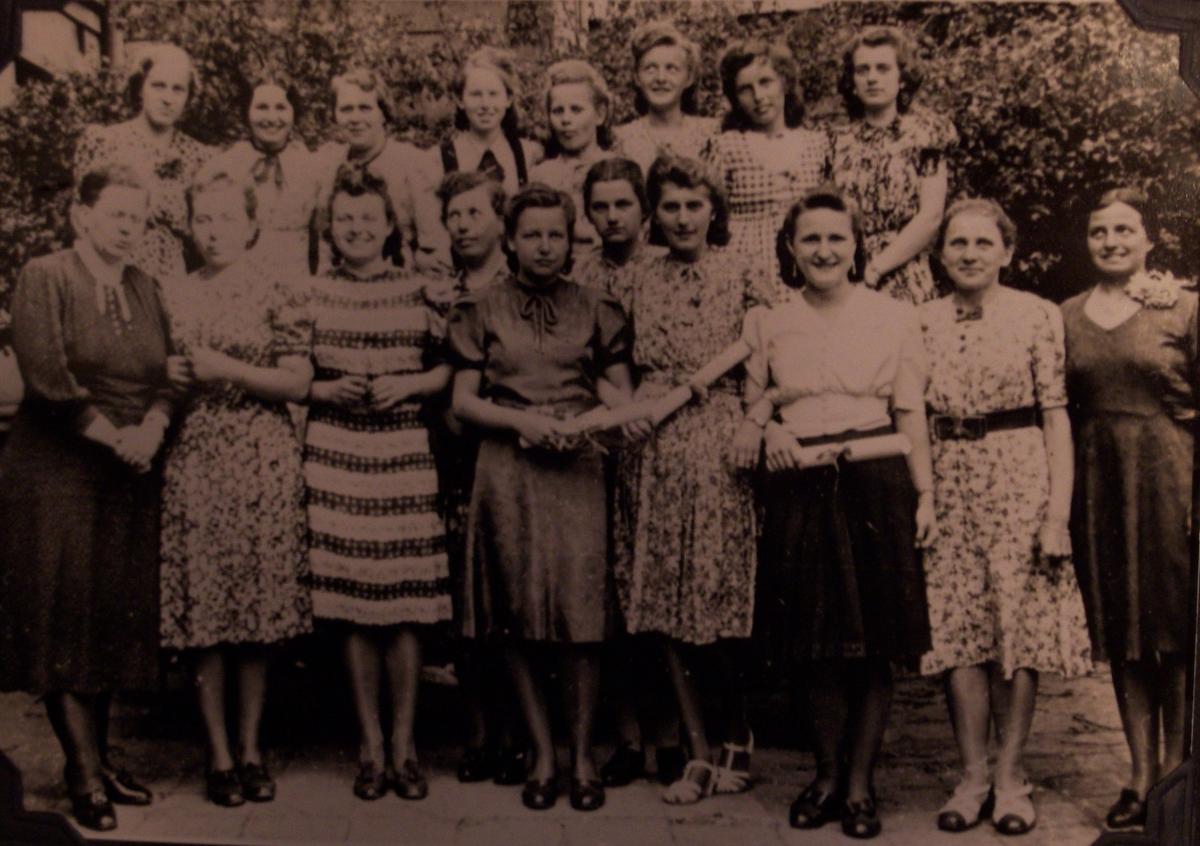 Relief Society sisters of the Breslau Center Branch (I. Gottschalk Müller)
Relief Society sisters of the Breslau Center Branch (I. Gottschalk Müller)
Irmgard Gottschalk was twenty-one and had finished her training as a saleswoman in 1941, when district president Martin Hoppe discussed with her the possibility of serving a mission. At the end of the second year of the war, there were no men left as full-time missionaries in the East German Mission. Proselytizing had been curtailed, but there was plenty of administrative work to be done in Berlin. The Gottschalk family lacked the funding for mission service, but President Hoppe promised to provide the money—30 Reichsmark per month—through the Breslau District. The final hurdle was conquered when Irmgard was able, in compliance with government requirements, to find a young woman to assume her position at work.[5]
When an epidemic of diphtheria and scarlet fever hit Breslau in 1941, two of the children of Georg and Julianna Baron were infected: Gisela (born 1933) and Renate (born 1937) were quarantined in a large hospital. Renate also contracted German measles and remained in the hospital for six months. They eventually recovered, but many children in the same hospital did not.[6]
Georg Baron was drafted into the German air force and sent to Czechoslovakia. He was fortunate to take his family with him to the large eastern city of Olomouc (German: Olmütz). When he was transferred to Vienna, Austria, in 1942, his family stayed in Olomouc and were still there when the war ended. Brother Baron was trained as a radar operator. One day, his unit was divided in half, his group being sent to France and the other to Russia. He later learned that essentially all soldiers in the other group had perished.[7]
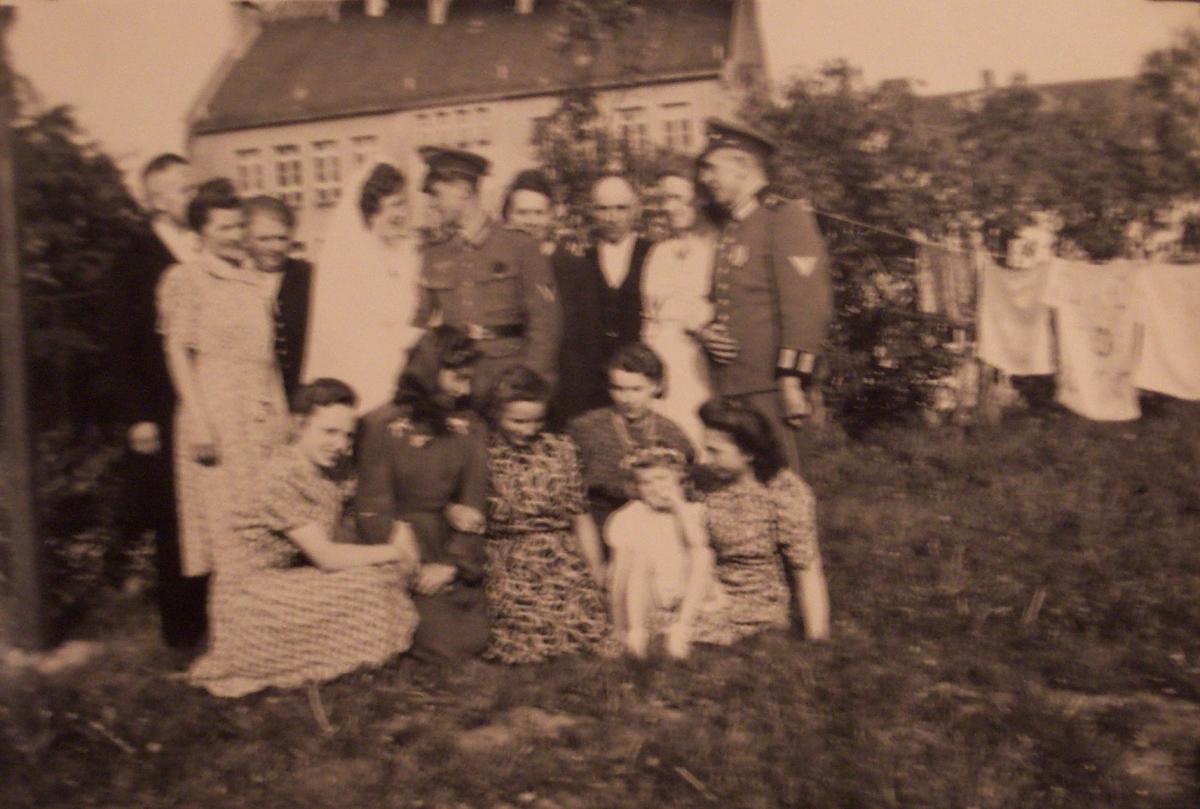 This picture was taken at the wedding of Herbert Gottschalk. (I. Gottschalk Müller)
This picture was taken at the wedding of Herbert Gottschalk. (I. Gottschalk Müller)
“I remember my first three years in school,” recalled Renate Baron:
The girls would sit on one side and the boys on the other. Every morning the first greeting was “Heil Hitler,” and we had to stand straight as arrows while we sang [the national anthem] “Deutschland, Deutschland über alles.” Discipline was everything, and we were punished if we misbehaved. . . . Two types of punishment I remember were standing in the corner facing the walls, and having a pencil placed on the backs of my hands while holding my hands palms down on the edge of my desk. If the pencil fell off, you would receive further punishment.[8]
Life in Czechoslovakia was very pleasant for Julianna Baron and her three daughters. Renate recalled fondly their walks through the parks of Olomouc. The country was to a great extent immune from the ravages of war; it was one of Hitler’s prewar “bloodless conquests” and was considered occupied territory by the Allies. In other words, the country was preserved by both friend and foe. Renate later summed up their situation, “Our family was very lucky to live in Czechoslovakia towards the end of the war because the country was spared extensive bombing at the time when Germany was being demolished.”[9] However, conditions were about to change.
On December 17, 1943, Irmgard Gottschalk was released as a full-time missionary and returned to Breslau. She married Heino Müller of the Danzig Branch of the Church on March 1, 1944. She then moved into the home of her parents-in-law in Danzig, where her husband was employed in submarine construction. Heino was drafted into the Waffen-SS in September, and Irmgard remained in his parents’ home.
In early 1945, the Müllers took their daughter-in-law, Irmgard, and fled Danzig when the Soviet invaders approached. They were fortunate to secure passage on a refugee ship that took them westward. Then they rode the train south to Zwickau, where they met up with Erika Fassmann Müller, another daughter-in-law who was also Irmgard’s former missionary companion. Thanks to their emergency preparations, Irmgard’s mother and a brother and sister were already in Zwickau. The Gottschalks were then taken in by the Suhrmanns, a Latter-day Saint family in the nearby Werdau Branch.
In the early spring of 1945, Julianna Baron had a strong impression to take her children west into Germany. She had not heard from her husband for six months, but she had learned that their home in Breslau had been totally demolished in an air raid and that her mother-in-law had perished in her basement. They began to make their way west and were allowed to ride on a farm trailer pulled by an old tractor. Not many days had passed before they were overtaken by Russian infantry. When she was about to be taken away by a soldier, Sister Baron produced a birth certificate showing that she had been born in Ukraine. The soldier left her in peace. Unfortunately, that good treatment was offset by poor treatment on the part of German soldiers nearby who wondered if she was a traitor. They insisted that she had even spoken Russian with the invaders. As Renate later recalled, “Soon thereafter they told us that there was no room for us on the trailer. There we stood beside a road somewhere, Mother and her three little girls.”[10]
The Baron odyssey was far from over. Thousands of German refugees were streaming through Czechoslovakia toward the German border. Along the way they passed heartbreaking scenes of destruction, suffering, and death. The greatest dangers were starvation and hostile action by Czech partisans. Indeed, on one occasion, partisans attacked a train in which the Baron family was traveling, but German soldiers defended the civilians. At the German border, Julianna Baron was shocked to learn that she was not allowed to cross. Their baggage was not ransacked or stolen, but they were forced to return east to Olomouc, a distance of 250 miles.[11]
In Olomouc, the four females of the Baron family were personae non gratae. As Germans, they were fortunate to have any kind of housing at all and were given secondary status when it came to ration coupons. Fortunately, Sister Baron’s Ukrainian heritage helped her avoid the torture inflicted upon German women by marauding Soviet soldiers. She found work in a candy factory, and the girls learned Czech while playing with the native children. They were blessed and happy, but two important components of their life were missing: they had last heard from their father, Georg Baron, in 1944, and since late 1941 the family had been totally isolated from the Church.
In 1946, a letter from Georg Baron finally reached his family in Olomouc. Assuming that the German status of his family prevented the delivery of many previous letters, he addressed the next in French and had a comrade post the letter in Switzerland. The tactic worked, and after two years his family in Olomouc learned that he was alive. Later that year, Julianna Baron proved to Czech authorities that her husband was living near Frankfurt, Germany, and she was finally allowed to travel there with her daughters. The family then settled in Langen, where they became members of a thriving community of Latter-day Saint refugees.[12]
Looking back on her wartime experiences, former missionary Irmgard Gottschalk Mueller made this statement (reflecting the sentiments of many Saints):
I always saw things from the gospel perspective. We had the holy scriptures and the prophets. Whenever we had the possibility, we looked for the Church and held meetings so that we could strengthen each other’s testimonies.
By the time the Baron family arrived in Germany, no members of the Center Branch were still living in Breslau (by then Wrocław, Poland). The branch had ceased to exist.
In Memoriam
The following members of the Breslau Center Branch did not survive World War II:
Herbert Hermann Görlitz b. Breslau, Schlesien, Preussen 27 Apr 1913; son of Hermann Paul Görlitz and Marie Anna Schlichting; bp. 2 Feb 1924; m. 7 Jan 1939; artillery gunner; d. hit by a train 12 Nov 1939; bur. Birkenfeld, Germany (Stern No. 24, Christmas 1939, 387; IGI; www.volksbund.de)
Kurt Heinz Gottschalk b. Breslau, Schlesien, Preussen (IGI) 12 Nov 1921; son of Karl Paul Gottschalk and Klara Reitzig; bp. 14 Jun 1930; k. in battle Krakow, Poland 31 Dec 1941; bur. Krakow Military Cemetery, Poland (Gottschalk, IGI; www.volksbund.de)
Walter Herbert Gottschalk b. Breslau, Schlesien, Preussen 1 or 31 Dec 1922; son of Karl Paul Gottschalk and Klara Reitzig; bp. 28 Feb 1931; m. 27 May 1944; k. in battle Vorwerk Ignatki, Poland 24 or 31 Dec 1941 or 1944 (Gottschalk, IGI)
Johannes Daniel Wilhelm Juras b. Breslau, Schlesien, Preussen 18 Sep 1921; son of Rudolf Ewald Juras and Meta Anna Raschke; bp. 25 Aug 1933; d. 29 Dec 1942. (IGI)
Kurt Fritz Erich Kobel b. Breslau, Schlesien, Preussen 27 Mar 1910; son of Karl Hermann Emil Kobel and Anna Pauline Vogt; bp. 5 Mar 1921; m. Breslau 3 Nov 1932, Mrs. Anni Kobel; soldier; k. in battle 1942 (Sonntagsgruss, No. 2, 18 Jan 1942, 8; IGI)
Robert Wilhelm Mathias Erwin Krause b. Breslau, Schlesien, Preussen 14 Aug 1917; son of Ernst Wilhelm Krause and Lina Martha Schlichting; bp. 24 Sep 1927; corporal airman; d. flying a raid over England 19 Jan 1941; bur. Cannock Chase, Great Britain (Sonntagsgruss, No. 20, 18 May 1941, p. 80; IGI; www.volksbund.de)
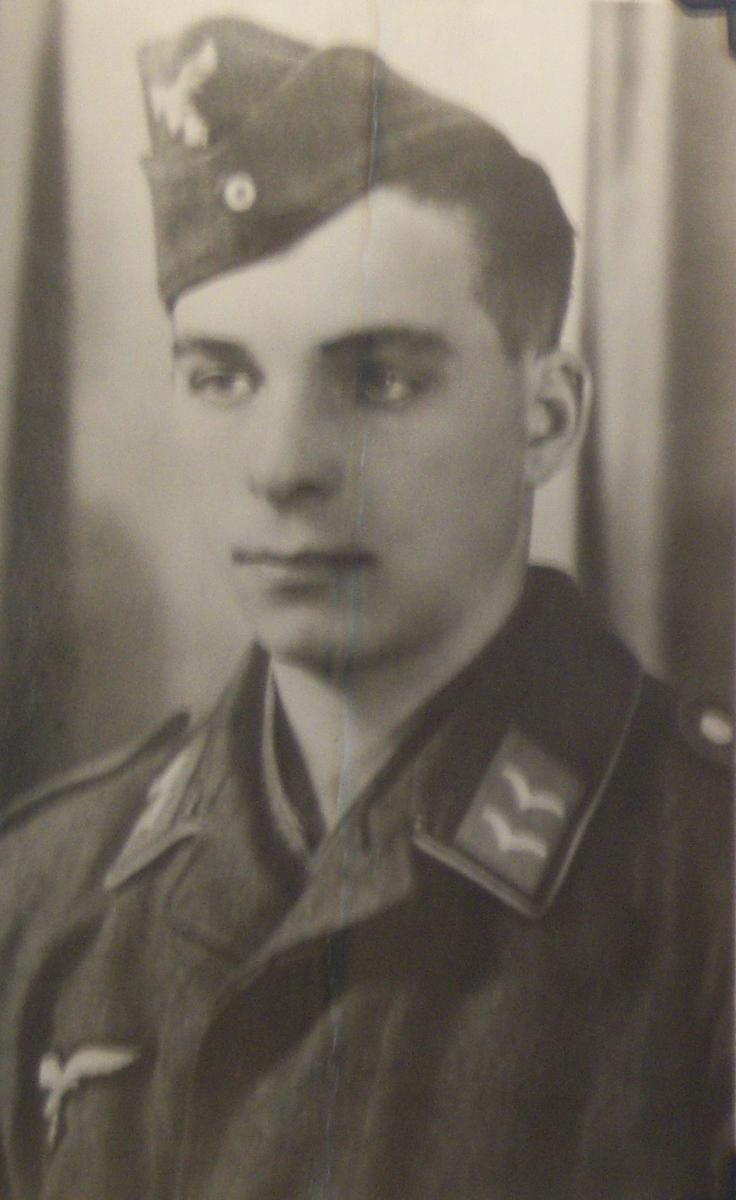
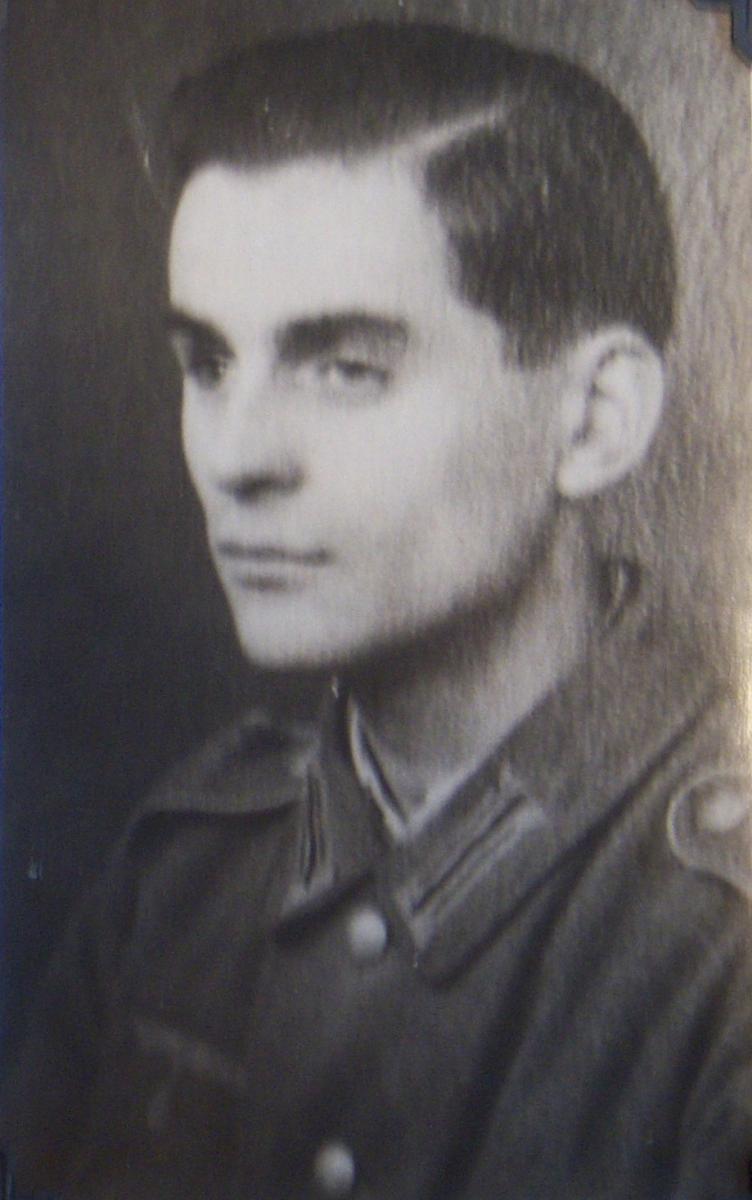 The Gottschalk brothers, Heinz (left) and Herbert, were two of the many Breslau Center Branch members in uniform. (I. Gottschalk Müller)
The Gottschalk brothers, Heinz (left) and Herbert, were two of the many Breslau Center Branch members in uniform. (I. Gottschalk Müller)
Notes
[1] Presiding Bishopric, “Financial, Statistical, and Historical Reports of Wards, Stakes, and Missions, 1884–1955,” CR 4 12, 257.
[2] Irmgard Ruth Gottschalk Müller, interview in German by Michael Corley, Salt Lake City, Utah, February 15, 2008; summarized in English by Judith Sartowski.
[3] East German Mission Quarterly Reports, 1939, no. 58, East German Mission History.
[4] Ibid.
[5] By law, healthy employees in wartime Germany were only allowed to quit if they could provide a replacement worker. See the East German Mission chapter for information about Irmgard’s service in the mission office in Berlin.
[6] Renate Baron Nebeker, “Renate’s Story,” 2 (unpublished). Private collection.
[7] Ibid.
[8] Ibid.
[9] Ibid., 3.
[10] Ibid.
[11] Ibid., 4–5.
[12] Ibid., 6–7.
